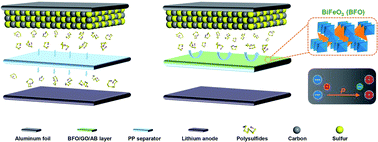Suppression of polysulfide shuttling with a separator modified using spontaneously polarized bismuth ferrite for high performance lithium–sulfur batteries†
Abstract
To effectively prevent polysulfides from transporting from the cathode to the anode is one of the critical prerequisites for the successful commercialization of lithium–sulfur batteries. Unfortunately, conventional commercially available polypropylene separators find it hard to meet this requirement due to their incapability of blocking polysulfide shuttling. Therefore, the development of a facile and scalable production of a new modified separator that can effectively regulate the shuttling of polysulfides will be very beneficial for the practical application of lithium–sulfur batteries. In this work, bismuth ferrite powder with spontaneous polarization is adopted to modify the separator owing to its special interaction with polysulfides. We develop a facile hydrothermal method to synthesize cubic-like bismuth ferrite particles of high purity, and apply them on the surface of the commercial separator with graphene oxide and a conductive agent. Our results show that the so-modified separator can effectively suppress the shuttling of polysulfides and then greatly improve the electrochemical properties of the lithium–sulfur battery in terms of cycle stability, rate performance, reaction kinetics, self-discharge behaviour and anode corrosion. Remarkably, our cell exhibits a high capacity density of 5.1 mA h cm−2 at an ultra-high sulfur loading of 5.6 mg cm−2, which is higher than that of known commercial lithium ion batteries.



 Please wait while we load your content...
Please wait while we load your content...